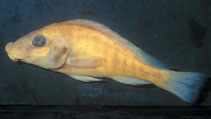| Family: |
Cichlidae (Cichlids), subfamily: Pseudocrenilabrinae |
| Max. size: |
15.1 cm TL (male/unsexed) |
| Environment: |
benthopelagic; freshwater |
| Distribution: |
Africa: Kunene river (Ref. 52863, 120641) and Cuvelai system (Ref. 33857, 52863) in Namibia. Also reported from Angola (Ref. 4983, 120641). Considered a Cunene River endemic in Ref. 120641. |
| Diagnosis: |
Description: moderately slender; head relatively large; snout relatively long; lips thickened and fleshy; frontal profile straight to slightly rounded; caudal fin truncate to subtruncate (Ref. 52307).
Coloration: front of head and dorsal parts of
body more brownish in males; cheeks and opercles, along with most of flanks and caudal peduncle, grayish-blue; ventral body parts more pale to light brown; some body scales reddish at their base; posterior portion of dorsal fin and caudal fin with reddish dots or maculae; anal fin with some egg spots; females grayish-brown to brown, without unique pigmentation or coloration
patterns (Ref. 52307). |
| Biology: |
Prefers rocky habitats (Ref. 7248, 52307). Possibly an ovophilic, agamous maternal mouthbroodar, like other members of the genus (Ref. 52307). |
| IUCN Red List Status: |
Least Concern (LC); Date assessed: 01 March 2007 Ref. (130435)
|
| Threat to humans: |
harmless |
Source and more info: www.fishbase.org. For personal, classroom, and other internal use only. Not for publication.
